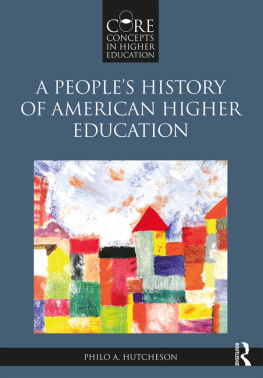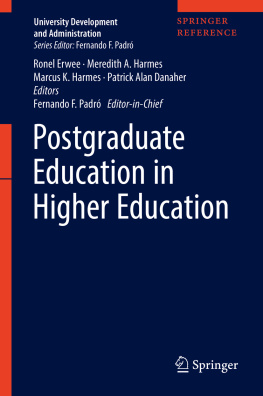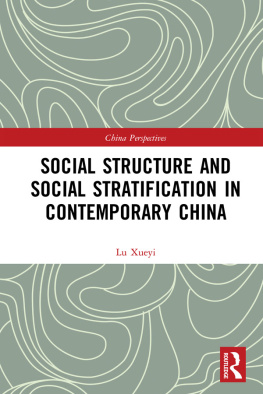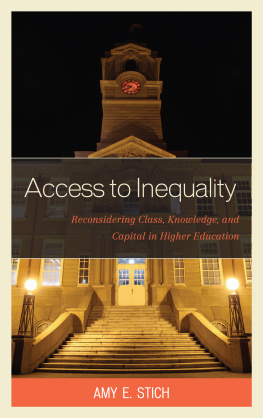Higher Education Choice in China
Much of the existing research on parental involvement and higher education choice examines the difference between the working class and the middle class, but little literature looks at different factions within the social classes. This book discusses higher education choice in China, particularly through the examination of social issues such as social stratification, parental involvement, and gender and educational inequality.
Drawing from an empirical study based on Bourdieus theory, the book explores both inter-class and intra-class differences in China, providing an insight into how social class differences influence a number of issues, including:
educational equality
the role parents, especially mothers, play in higher education decision-making
the relationship between traditional cultural norms
gendered relationships within Chinese families.
The sociology of higher education choices are derived through feedback from various sources, including both parents and students themselves. The book will be key reading for postgraduates and researchers in the fields of sociology, sociology of education, Chinese studies and Asian studies.
Xiaoming Sheng has a PhD in Sociology of Education from the University of Cambridge, UK. Prior to her doctoral studies, she was a Research Fellow in the Department of Sociology at Beijing University, China.
Routledge Research in Asian Education
This is an interdisciplinary series focusing on education in Asia. Open to established and emerging scholars with a focus on the region, it aims to inform readers of the latest research and contribute to the growth of scholarship on Asian Education.
Books in the series include:
General Education and the Development of Global Citizenship in Hong Kong, Taiwan and Mainland China: Not merely icing on the cake
Edited by Xing Jun, Ng Pak-sheung and Cheng Chunyan
Higher Education Choice in China: Social stratification, gender and educational inequality
Xiaoming Sheng
Higher Education Choice in China
Social stratification, gender and educational inequality
Xiaoming Sheng
First published 2014
by Routledge
2 Park Square, Milton Park, Abingdon, Oxon OX14 4RN
and by Routledge
711 Third Avenue, New York, NY 10017
Routledge is an imprint of the Taylor & Francis Group, an informa business
2014 Xiaoming Sheng
The right of Xiaoming Sheng to be identified as author of this work has been asserted by her in accordance with sections 77 and 78 of the Copyright, Designs and Patents Act 1988.
All rights reserved. No part of this book may be reprinted or reproduced or utilised in any form or by any electronic, mechanical, or other means, now known or hereafter invented, including photocopying and recording, or in any information storage or retrieval system, without permission in writing from the publishers.
Trademark notice: Product or corporate names may be trademarks or registered trademarks, and are used only for identification and explanation without intent to infringe.
British Library Cataloguing in Publication Data
A catalogue record for this book is available from the British Library
Library of Congress Cataloging in Publication Data
Sheng, Xiaoming.
Higher education choice in China: social stratification, gender and educational inequality / Xiaoming Sheng.
pages cm. -- (Routledge research in Asian education)
1. Education, Higher--Social aspects--China.. 2. College choice--Social aspects--China. 3. Educational sociology--China. 4. Universities and colleges-- Sociological aspects--China. 5. Sex differences in education--China. 6. Educational equalization--China. 7. Social stratification--China. 8. Social classes--China. I. Title.
LC191.98.C6S54 2014
378.54--dc23
2013043798
ISBN: 978-0-415-84309-6 (hbk)
ISBN: 978-1-315-81425-4 (ebk)
Typeset in Galliard
by Saxon Graphics Ltd, Derby
Contents
This book has sprung from involvement in my dissertation research and accrued a corresponding number of debts, there are too many people who have helped me to acknowledge fully here. The professional support from Professor Diane Reay has been invaluable.
This book is for my parents. I would like to show my gratitude to them for their love and support during the whole period of this research study. I would like to express my most sincere gratitude to Sheila for her belief in me and full support all the time. I am also very thankful for the full support from Sister Siu. I also wish to thank to all the interviewees and respondents involved in the process of the quantitative and qualitative data collection for their kind and full support during the period of my fieldwork.
Xiaoming Sheng
August 2013
GSS district-level key-point schools
LIS low-income schools/classes
NKS national/city-level key-point schools
Why choose higher education choice in China?
Since China entered the period of reform and opening up, Chinese society has been in a process of transition from a planned centrally controlled economy to a market economy (Bian, 2002). The market transition that has taken place over the past three decades has involved radical changes in the countrys economy and social structure (Lu, 1989, 2001). For instance, Chinese class stratification has been transformed from a rigid classification based on status, in the Mao period, to an open, evolving multiple class system in the post-Mao period (Bian, 2002). Li (2000) argues that the middle class was mainly composed of officials, intellectuals and workers in the state-owned enterprises in the Mao era (19491977).
After China entered the 1980s, several Chinese sociologists recognised that a new middle class was emerging in China (Li, 2000). A growing body of research has focused on the definition of the Chinese middle classes; for example, managers, professionals and private entrepreneurs are now seen to comprise the Chinese middle classes (Qin, 1999:2948). Li (2005) considers that the middle class is now composed of Party and government officials, managers of enterprises, private entrepreneurs, professionals and technocrats. It has also been recognised that the traditional class stratification of China was based on occupational classification, with a focus on individual income (Li, 2000; Sun, 2003). Now the individuals educational level is also taken into consideration (Li, 2000; Li, 2005; Zhou, 2005).
As a transitional society, the social structure in China is now fluid and unstable (Bian, 2002). Consequently, the transitional society of China may be more open to social mobility insofar as it is more active and fluid than highly stratified societies, such as the UK and the USA. This view has been supported by the studies of Yang (2003), who argues that in a transitional society the social structure is in a kind of dynamic balance. In the process of maintaining this balance the competition for certain social positions is likely to be more intense. Collins (2000) found that education and academic achievement have close connections with an individuals social position. Guo (2002) and Yang (2003) have observed that education can be seen as a key factor in social mobility, particularly in Chinese transitional society.








